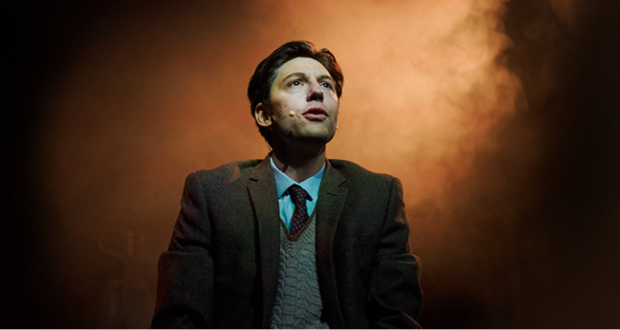Joan Greening, Joel Goodman and Jan Osborne’s musical biography of Alan Turing is an impactful portrayal of genius that powerfully captures the tragedy of Turing’s life.Summary
Rating
Good
Alan Turing led a brilliant, fascinating and tragic life: a fantastic subject for a musical biography. This show, written by Joan Greening and composed by Joel Goodman and Jan Osborne, powerfully captures his suffering, his achievements and the sad events that led to his suicide.
There are many poignant songs, especially towards the end, which capture the awful pressures on gay men when homosexuality was illegal in Britain. Through song, we are taken inside Turing’s pain as we encounter a man hiding his true self from mid-20th century conservative British society and finding little hope of acceptance. Greening, Goodman and Osborne do a great job fitting Turing’s life into songs. A particular highlight is a number explaining the complex theory behind The Turing Test, aka The Imitation Game, in an accessible way. On the other hand, I didn’t catch myself singing any of the songs on the way home.
The tone is sad throughout and builds to a devastating conclusion, effectively foreshadowing from the very beginning. Recurring motifs are used well, such as references to machines thinking or to Snow White being cursed after eating an apple– a nod to Turing’s death from eating a cyanide laced apple. These moments give a heightened resonance to those familiar with Turing’s story.
Turing’s life, and especially his death, are tragic. The conclusion is an appropriate ending, but the show would have benefited from some tonal variation before the final moments. Turing’s life was not all misery: there were great triumphs, which are acknowledged. For instance, the fact that his work saved millions of lives. He made a huge contribution to mathematics and computer science, which are included but are not presented as emotional highs to offset the terrible lows that build to the devastating ending. More variety would have made the story more engaging, and the songs, more memorable.
Joe Bishop is completely convincing as Turing, and Zara Cooke excels playing all the other roles. Bishop’s performance is not the standard portrait of genius we have come to expect from popular culture. Benedict Cumberbatch’s Sherlock Holmes and Jim Parsons’s Sheldon Cooper, from The Big Bang Theory, cast long shadows over how genius is portrayed, heavily influencing Cumberbatch’s own performance as Turing in The Imitation Game. Refreshingly, here we see that even a frustrated genius can be brilliant without being arrogant. They can even be kind and thoughtful. This makes Turing seem more human and less of an intellectual titan, which makes his death more impactful. Joan Clarke is also a well-developed character, and her contribution to breaking the Enigma Code is celebrated and used effectively to show that great work is also teamwork.
Many historical events pass by quickly in this 80-minute show, which would have benefited from being longer. I am glad that more obscure parts of Turing’s mathematical genius, such as his work on morphogenesis, is covered. Songs about Colossus, other machines that Turing worked on and his theories on machine intelligence are used to accessibly weave these details into the story. The Second World War is pushed to the background, which allows Turing’s character and his relationships to come to the fore. However, Turing’s relationship with Arnold Murray, which is key to the events leading up to his death, mainly happens off stage; it would have been more powerful to see this relationship dramatised.
Alan Turing – A Musical Biography effectively captures the tragedy of Turing’s life, but it would have been stronger if it had found the time to celebrate his life as well.
Written by: Joan Greening
Directed by: Jane Miles
Composed and produced by: Joel Goodman
Musical director and assistant composer: Jan Osborne
Produced by: Early Mornings Productions Ltd
Alan Turing – A Musical Biography plays at Riverside Studios until 27 January. Further information and bookings can be found here.
 Everything Theatre Reviews, interviews and news for theatre lovers, London and beyond
Everything Theatre Reviews, interviews and news for theatre lovers, London and beyond



